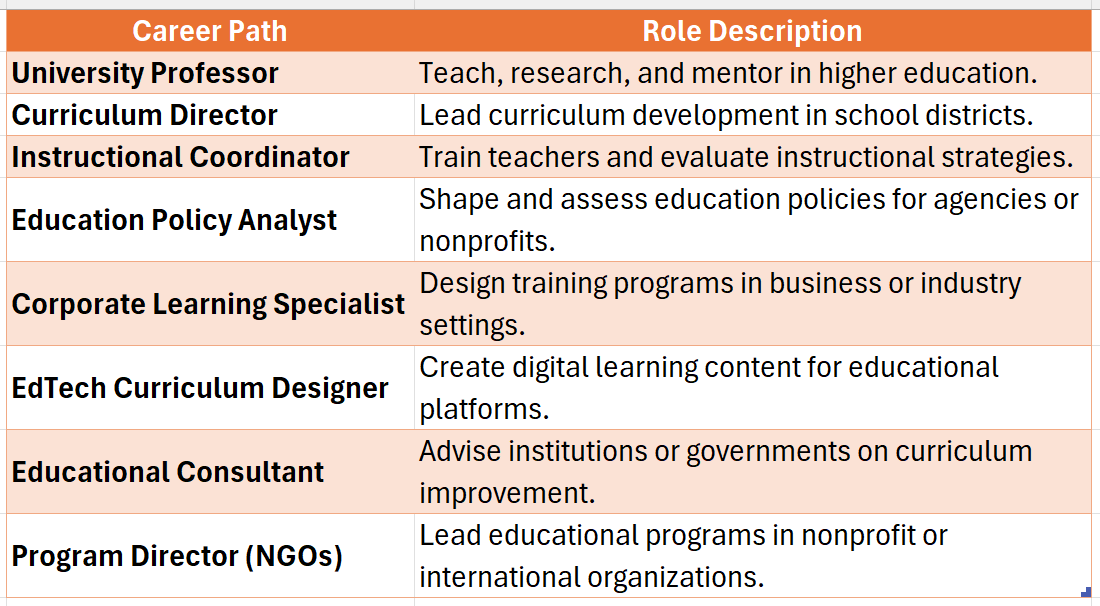Understanding what a doctorate in education curriculum and instruction is can open doors to exciting opportunities. This advanced degree focuses on enhancing teaching methods and educational programs, making it essential for educators who want to lead and innovate in their field.
What Does This Degree Involve?
A doctorate in education curriculum and instruction dives deep into how students learn and how to create effective educational experiences. Here are some key aspects:
- Research Focus: You’ll conduct studies that can shape future teaching practices.
- Curriculum Development: Learn to design curricula that meet diverse student needs.
- Leadership Skills: Prepare to take on leadership roles in educational settings.
Why Pursue This Degree?
Earning a doctorate in education curriculum and instruction can be a game-changer. Here are some benefits:
- Career Advancement: Positions like curriculum director or educational consultant often require this level of education.
- Specialization Options: You can even pursue a post doctoral in education or a doctorate in gifted education online, tailoring your studies to your interests.
- Impactful Work: You’ll have the chance to influence educational policies and practices, making a real difference in students’ lives.
Contact Now to Pursue Your Dream Degree From Your Nearest College
What Are the Core Components of a Doctorate in Curriculum & Instruction?
A doctorate in curriculum & instruction is a vital achievement for educators aiming to enhance their teaching and learning expertise. This advanced degree focuses on creating effective educational programs and strategies, making it crucial for anyone considering this path to understand its core components, which significantly influence the future of education.
Core Components of a Doctorate in Curriculum & Instruction
- Curriculum Development: Students learn to design and evaluate educational programs tailored to diverse student needs, incorporating various teaching methods and learning theories.
- Instructional Leadership: This aspect trains graduates to lead educators and shape school policies effectively.
- Research Methodology: A strong emphasis on research equips students to conduct studies that enhance educational practices, essential for those pursuing a post doctoral in education.
- Gifted Education: Many programs include specialized courses, like a doctorate in gifted education online, preparing educators to support advanced learners uniquely.
By understanding these components, prospective students can see how a doctorate in education curriculum and instruction not only enhances their skills but also opens new opportunities in the educational field, ultimately making a lasting impact on students and schools.
How Does a Doctorate in Education Curriculum and Instruction Differ from Other Doctorates?
When considering advanced education, many wonder about the differences between various doctorate programs. A doctorate in education curriculum and instruction stands out because it focuses specifically on how to improve teaching and learning processes. This specialization is crucial for educators who want to make a significant impact in schools and educational systems.
Unique Focus Areas
Unlike other doctorates, such as a post doctoral in education, which may emphasize research or administrative roles, a doctorate in education curriculum and instruction hones in on curriculum development and instructional strategies. This means you’ll dive deep into how to design effective learning experiences for students.
Benefits of Specialization
- Tailored Learning: You’ll learn specific skills that directly apply to teaching and curriculum design.
- Career Opportunities: Graduates can pursue roles as curriculum specialists, educational consultants, or even professors.
- Online Options: Many universities offer a doctorate in gifted education online, making it accessible for busy professionals.
In summary, if you’re passionate about enhancing education, this doctorate offers a unique path that sets it apart from other advanced degrees.
What Career Opportunities Await Graduates of a Doctorate in Curriculum & Instruction?

A doctorate in curriculum and instruction opens up a world of exciting career opportunities. This advanced degree not only deepens your understanding of educational theories but also equips you with the skills to implement effective teaching strategies. Whether you’re passionate about shaping future educators or enhancing student learning, this degree is your gateway to making a significant impact in the education field.
Career Paths for Graduates
Graduates of a doctorate in education curriculum and instruction can explore various roles, including:
- Curriculum Developer: Design and evaluate educational programs.
- Educational Consultant: Advise schools on best practices.
- University Professor: Teach and mentor future educators.
- Director of Education: Oversee educational initiatives in schools or districts.
- Post Doctoral Researcher: Engage in advanced research projects.
Each of these roles allows you to influence educational practices and policies, making a difference in students’ lives. Additionally, for those interested in specialized areas, pursuing a doctorate in gifted education online can be a great option. This path focuses on developing programs for gifted students, ensuring they receive the challenges they need to thrive. With a post doctoral in education, you can further your research and expertise, contributing to innovative educational solutions.
Is a Doctorate in Curriculum & Instruction Worth the Investment?
When considering a career in education, many wonder, “Is a Doctorate in Curriculum & Instruction worth the investment?” This advanced degree can open doors to leadership roles and specialized positions in education. Understanding its value is crucial for anyone passionate about shaping learning experiences.
Benefits of a Doctorate in Education Curriculum and Instruction
- Career Advancement: A doctorate can lead to higher positions, such as curriculum director or educational consultant.
- Expertise Development: You’ll gain deep knowledge in teaching methods and curriculum design, making you a valuable asset in education.
- Research Opportunities: Engage in groundbreaking research, especially if you’re interested in a post doctoral in education.
Online Options for Flexibility
Many universities now offer a doctorate in gifted education online, allowing you to balance work and study. This flexibility can make pursuing your degree more manageable, especially for busy educators. With the right mindset and dedication, a doctorate in curriculum and instruction can be a transformative experience. It not only enhances your skills but also empowers you to impact future generations of learners. So, if you’re ready to invest in your future, this degree might just be the perfect fit!
Exploring the Admission Requirements for Doctorate Programs in Education
When considering a doctorate in education curriculum and instruction, it’s essential to understand the admission requirements. This advanced degree opens doors to leadership roles in education, allowing you to shape teaching methods and improve student outcomes. But what does it take to get there?
Key Admission Requirements
- Educational Background: Most programs require a master’s degree in education or a related field. Some may even accept a post doctoral in education.
- GPA Standards: A minimum GPA is often necessary, typically around 3.0 or higher.
- Letters of Recommendation: Strong endorsements from educators or professionals in the field can boost your application.
- Personal Statement: This is your chance to share your passion for education and your goals for pursuing a doctorate in gifted education online.
Additional Considerations
- Standardized Tests: Some programs may require GRE scores, while others have moved away from this requirement.
- Interview Process: Be prepared for an interview, as it helps programs assess your fit and commitment.
- Research Interests: Clearly defining your research interests can make your application stand out.
Contact Now to Pursue Your Dream Degree From Your Nearest College
What Skills Will You Gain from a Doctorate in Curriculum & Instruction?
A doctorate in curriculum and instruction is not just a degree; it’s a transformative journey into education. Understanding the skills you will gain from this advanced program is crucial in deciding if it’s the right fit for you. This degree enhances your knowledge and equips you with practical tools to make a significant impact in the classroom.
Critical Thinking and Problem Solving
One essential skill you’ll develop is critical thinking. You’ll learn to analyze educational theories and practices, enabling you to create effective curricula. This skill is vital for those pursuing a post doctoral in education, as it helps address complex educational challenges.
Leadership and Collaboration
Leadership is another key skill. You’ll learn to lead educational initiatives and collaborate with fellow educators. This is especially beneficial for those interested in a doctorate in gifted education online, as it prepares you to work with diverse student populations and advocate for their needs.
Research and Evaluation Skills
Finally, you’ll enhance your research skills, including evaluating educational programs and assessing their effectiveness. These skills are crucial for influencing educational policy and improving teaching practices. Overall, a doctorate in education curriculum and instruction opens doors to a rewarding career in education.
How Can ‘CollegeDegree.Education’ Support Your Journey to a Doctorate in Education?
A Doctorate in Curriculum & Instruction is more than just a degree; it’s a pathway to becoming a leader in education. This advanced degree focuses on developing effective teaching strategies and improving educational programs. Understanding this can help you make informed decisions about your future in education.
At ‘CollegeDegree.Education’, we believe in empowering educators. Here’s how we can assist you:
- Comprehensive Resources: Access a wealth of materials on a doctorate in education curriculum and instruction, helping you understand the curriculum and requirements.
- Expert Guidance: Our team offers insights into post doctoral in education opportunities, ensuring you’re well-prepared for the next steps in your academic journey.
- Flexible Learning Options: Explore our doctorate in gifted education online programs, designed to fit your busy schedule while providing a robust educational experience.
Future Trends in Curriculum Development: The Role of Doctorate Holders
In today’s rapidly changing educational landscape, understanding what a doctorate in curriculum and instruction entails is crucial. This advanced degree not only prepares educators to lead in curriculum development but also equips them with the skills to innovate teaching practices. As we look to the future, the role of doctorate holders in shaping educational experiences becomes even more significant.
Innovative Curriculum Design
Doctorate holders in education curriculum and instruction are at the forefront of creating engaging and effective learning environments. They utilize research-based strategies to develop curricula that meet diverse student needs. This is especially important as schools increasingly focus on personalized learning experiences.
Emphasis on Gifted Education
With a growing interest in specialized programs, pursuing a doctorate in gifted education online is becoming more popular. Educators with this expertise can design programs that challenge and inspire gifted students, ensuring they reach their full potential. This focus on differentiation is vital for fostering talent in every classroom.
Contact Now to Pursue Your Dream Degree From Your Nearest College
FAQs
1. What is a Doctorate in Curriculum and Instruction?
It’s an advanced degree focused on designing, evaluating, and improving educational programs, teaching methods, and curriculum development at all educational levels.
2. What’s the difference between an Ed.D. and a Ph.D. in Curriculum and Instruction?
An Ed.D. is practice-focused, ideal for educational leaders and administrators. A Ph.D. is research-oriented, best for those pursuing academic or policy-related careers.
3. Who should pursue this degree?
It’s ideal for educators, curriculum specialists, instructional coordinators, and education leaders who want to influence teaching practices or education policy.
4. How long does it take to complete the program?
Most programs take 3 to 5 years, depending on whether you study full-time or part-time and the time needed to complete a dissertation.
5. What are the admission requirements?
Typically, you need a master’s degree in education or a related field, teaching or leadership experience, GRE scores (optional at some schools), letters of recommendation, and a personal statement.
6. What will I study in the program?
Courses usually cover curriculum theory, instructional design, learning assessment, educational research methods, and leadership in education.


